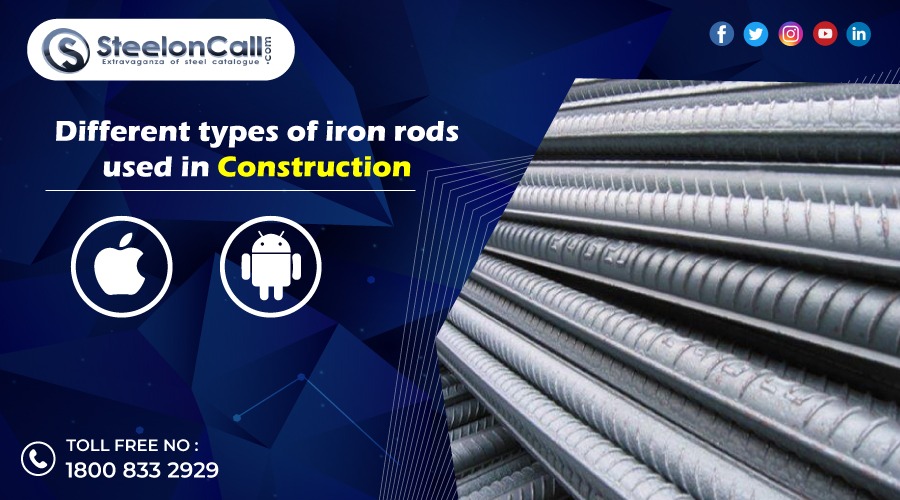Exploring Types Of Iron Rods Used In Construction - A Comprehensive Guide

Iron rods, commonly referred to as reinforcing bars or rebars, are integral components of reinforced concrete structures in construction. They provide essential tensile strength and structural integrity to buildings and infrastructure projects alike, and selecting the appropriate type is vital for safety, durability, and longevity. This guide explores various types of iron rods used for building projects as well as their properties, advantages and applications - providing insight into why they play such an essential role in modern day infrastructure construction projects.
1. Mild Steel Rebars (MSR):
Properties: Mild steel rebars are made from low carbon steel and feature smooth surface textures that make bending and cutting simple. Their limited tensile strength makes them suitable for smaller construction projects in non-seismic regions.
Applications: It is typically employed in residential and small-scale construction projects where corrosion is not a significant concern, as well as low stress applications like plastering and residential column and beam construction.
2. Deformed High-Strength Bars (HSD Bars):
Properties: HSD bars are constructed from high-strength steel and feature deformations along their length, providing enhanced tensile strength over MSR bars and making them the ideal solution for projects in earthquake-prone regions due to their superior ductility.
Applications: Whilst WBCs are widely utilized for high-rise buildings, bridges, and heavy construction projects in seismic zones to increase structural integrity and mitigate collapse during earthquakes. They should also be recommended as reinforcement measures in seismically active regions as a measure to increase resilience against collapse risk.
3. TMT Bars:
Properties: TMT bars undergo a unique heat treatment process that confers special properties to them, giving them superior strength and ductility. Their unique ribbed design also guarantees great adhesion with concrete.
Advantages: Brushed aluminum has high corrosion resistance. Weldability is excellent and there is less chance of bar buckling during concrete pouring.
Applications: When used properly, these panels can be an indispensable addition to a wide range of construction projects ranging from residential, commercial, and industrial structures. Their high humidity resistance makes them particularly suitable for use in harsh environmental environments.
4. Corrosion-Resistant Rebars:
Properties: Corrosion-resistant rebars are typically constructed from carbon steel with added elements like copper, phosphorus and chromium to increase corrosion resistance, prolonging their useful lifespan in structures.
Application: Wrought iron corrosion control products can be found in coastal environments, sewage treatment plants, and any project where corrosion is a significant concern. In particular, corrosion resistant solutions are best utilized in regions with high humidity or exposure to potentially corrosive substances.
5. Epoxy-Coated Rebars:
Properties: Epoxy-coated rebars are standard steel bars coated with an epoxy layer for protection against moisture and other forms of corrosion, helping prevent rust and corrosion over time.
Applications: CIP systems are most often employed for bridge and concrete structure construction projects exposed to de-icing salts. CIP is suitable for cold and wet climate projects.
6. Galvanized Rebars:
Properties: These galvanized steel bars are protected with an outer coating of zinc which acts as a sacrificial layer against corrosion. This method makes galvanizing cost effective while offering increased corrosion protection to the steel underneath it.
Applications: Our corrosion proof coating is often utilized in structures such as parking garages and marine applications, where resistance against rust and corrosion are key factors in maintenance costs. Furthermore, it excels in humid areas exposed to potentially corrosive substances.
7. Properties of Stainless Steel Rebars:
Properties: Rebars manufactured from high-grade stainless steel such as grades 304 or 316 offer exceptional corrosion resistance and strength.
Applications: Withstanding harsh environments like chemical plants, coastal regions and medical facilities. Ideal for long-lasting structures requiring minimum upkeep.
8. Fiber-Reinforced Polymer (FRP) Bars:
FRP Bars Come in Two Main Varieties: Carbon Fiber Reinforced Polymer (CFRP) and Glass Fiber Reinforced Polymer (GFRP).
Properties:
Properties for Carbon Fiber Reinforced Polymer (CFRP) Bars.
CFRP bars consist of carbon fibers embedded within a polymer matrix and feature extremely lightweight construction with superior tensile strength.
Advantages: Inherent resistance to corrosion and chemicals; Low thermal expansion rates. Easy handling and installation processes. When applied to applications:
Widely utilized in retrofitting existing structures, seismic retrofitting, and strengthening of structural members. Great for heritage building preservation as well as reducing dead load on structures.
9. Glass Fiber Reinforced Polymer (GFRP) Bars:
Properties: GFRP bars consist of glass fibers embedded within a polymer matrix and exhibit high tensile strength, making them lightweight yet strong enough for everyday applications.
Advantages: Long lasting corrosion and chemical resistance. Non Conductive nature makes these panels suitable for electrically sensitive environments.
Applications: When used in applications requiring nonmagnetic and nonconductive properties such as MRI rooms and bridges. When placed in environments prone to corrosion like wastewater treatment plants.
Conclusion:
Selecting the ideal type of iron rods for a construction project can have profound effects on its integrity, safety and lifespan. Each type of iron rod offers specific properties and advantages tailored to specific applications and environments. Understanding the unique properties of iron rods helps construction professionals make informed choices that contribute to the success and durability of their projects. Iron rods' versatility enables builders to meet all kinds of construction needs with ease, meeting safety and performance expectations with each structure they create. Overall, iron rods offer a complete solution for each challenge they encounter in construction projects.

